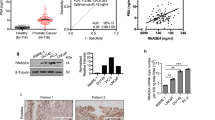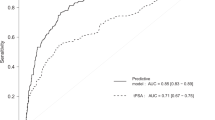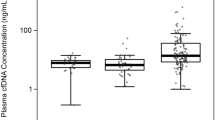Abstract
Among women with node-negative breast cancer and small tumours, it is important to identify those with tumours that will recur, so that they may receive adjuvant therapy, while sparing those with tumours that will not recur the hazards of adjuvant treatment. A reverse transcriptase-polymerase chain reaction (RT-PCR) for prostate-specific antigen (PSA) may be used to identify circulating metastatic cells in patients with prostate cancer. Approximately 30% of breast cancer cells also produce PSA. Therefore, we tested the PSA RT-PCR assay on blood specimens from women with breast cancer. We evaluated 78 women at Mount Sinai Medical Center with histologically confirmed breast cancer. Venous blood (5 cm3) from the women was collected in ethylene diaminetetraacetic acid (EDTA)-treated collection tubes and approximately 400 ng of RNA from each sample was subjected to an RT-PCR. We were able to detect the amplified PSA fragment in 18 of 78 women with breast cancer; 7 of the 18 women with the PSA fragment had localised, small, node-negative tumours, both oestrogen receptor (ER) positive and ER negative. We could not detect the amplified PSA fragment in 20 normal women and 22 normal men. We conclude that PSA RT-PCR may be a useful method for determining the presence of circulating metastatic cells in some women with node-negative breast cancer, and therefore the potential for these women to develop recurrent disease and thus benefit from adjuvant therapy.
This is a preview of subscription content, access via your institution
Access options
Subscribe to this journal
Receive 24 print issues and online access
$259.00 per year
only $10.79 per issue
Buy this article
- Purchase on Springer Link
- Instant access to full article PDF
Prices may be subject to local taxes which are calculated during checkout
Similar content being viewed by others
Author information
Authors and Affiliations
Rights and permissions
About this article
Cite this article
Lehrer, S., Terk, M., Piccoli, S. et al. Reverse transcriptase-polymerase chain reaction for prostate-specific antigen may be a prognostic indicator in breast cancer. Br J Cancer 74, 871–873 (1996). https://doi.org/10.1038/bjc.1996.450
Issue Date:
DOI: https://doi.org/10.1038/bjc.1996.450
This article is cited by
-
Reconnoitring the Status of Prostate Specific Antigen and its Role in Women
Indian Journal of Clinical Biochemistry (2015)
-
Expression of prostate-specific antigen (PSA) correlates with poor response to tamoxifen therapy in recurrent breast cancer
British Journal of Cancer (1999)
-
Reverse transcriptase/polymerase chain reaction analysis of parathyroid hormone-related protein for the detection of tumor cell dissemination in the peripheral blood and bone marrow of patients with breast cancer
Journal of Cancer Research and Clinical Oncology (1997)



